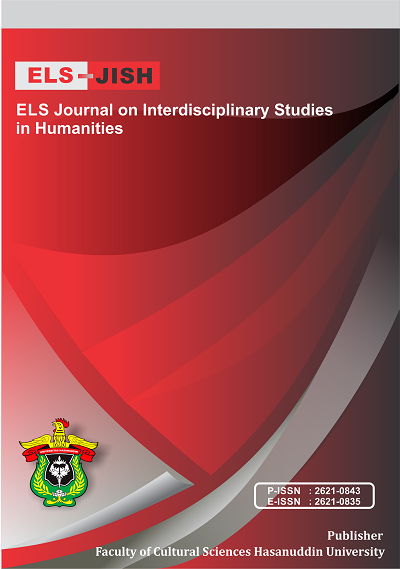Hitoshi Imamura’s Concept of the Human as a Meaning-Ascriber: A Lesson to the “Post-Truth” World
DOI:
https://doi.org/10.34050/elsjish.v6i2.26749Keywords:
Hitoshi Imamura, Humanities, Japanese theory, Philosophy, Post-truthAbstract
This research note has two objectives. One is to concisely explain a theoretical discourse which the Japanese philosopher Hitoshi Imamura propounds in the first part of his article titled “Studying Economy: Make the Drive for Meaning our Primum Mobile”. The other is, by expanding Imamura’s ideas, to derive insights beneficial to the contemporary era. To achieve them, the discussion employs explicative reading as its method and develops as follows. After an introduction mentioning a previous study on Imamura’s thought, the first section dissects Imamura’s line of reasoning and demonstrates that Imamura essentially advances the following thesis: A human is a being that is unable to be content with the world as it is and inevitably and constantly looks for a (concealed) meaning. The second section explicates Imamura’s observations which relate to the proposition and whose potentialities Imamura does not fully exploit. Thereupon, it concludes that, by acknowledging that each individual lives in a unique network of meanings but that the meanings are correctable, we can amend the present world some have qualified as “post-truth”
References
Imamura, H. (1998). Studying economy: Make the drive for meaning our primum mobile. Nikkei Shimbun, 31.
Mikado, N. (2022). Humanity as homo ideologicus: On hitoshi imamura’s theory of general ideology. Brownstone Institute. brownstone.org/articles/humanity-as-homo-ideologicus-on-hitoshi-imamuras-theory-of-general-ideology/
Heidegger, M. (2008). Being and time. Harper Perennial Modern Thought.
Merleau-Ponty M. (2014). Phenomenology of perception. Routledge.
Althusser L. (2020). On ideology. Verso.
Azuma, H. (2022). The philosophy of correctability: Or on a New Publicness. Genron, 12, 31-105.
Coleman, L. (2019). The Obscene in the Everyday: The Pornographers. Killers, Clients and Kindred Spirits: The Taboo Cinema of Shohei Imamura, 139.
Ohji, K. (2015). Premières réceptions d’Althusser au Japon. La Pensée, (2), 127-137.
Rahman, F. (2018). The Constraints of Foreign Learners in Reading English Literary Works: A Case Study at Hasanuddin University. Journal of Arts and Humanities, 7(2), 01-12.
Rahman, F. (2019). Save the world versus man-made disaster: A cultural perspective. In IOP Conference Series: Earth and Environmental Science (Vol. 235, No. 1, p. 012071). IOP Publishing.
Rahman, F., Sutanto, T. E., & Fitriyati, N. (2021). Web Traffic Anomaly Detection using Stacked Long Short-Term Memory. InPrime: Indonesian Journal of Pure and Applied Mathematics, 3(2), 112-121.
Rhodes, R. F. (2019). The Religious Philosophy of Kiyozawa Manshi. The Dao Companion to Japanese Buddhist Philosophy, 537-563.
Shaoyang, L. (2013). Japanese Postmodern Philosophy's Turn to Historicity. Journal of Japanese Philosophy, 1(1), 111-135.
Downloads
Published
How to Cite
Issue
Section
License
Copyright (c) 2023 Naruhiko Mikado

This work is licensed under a Creative Commons Attribution-ShareAlike 4.0 International License.






